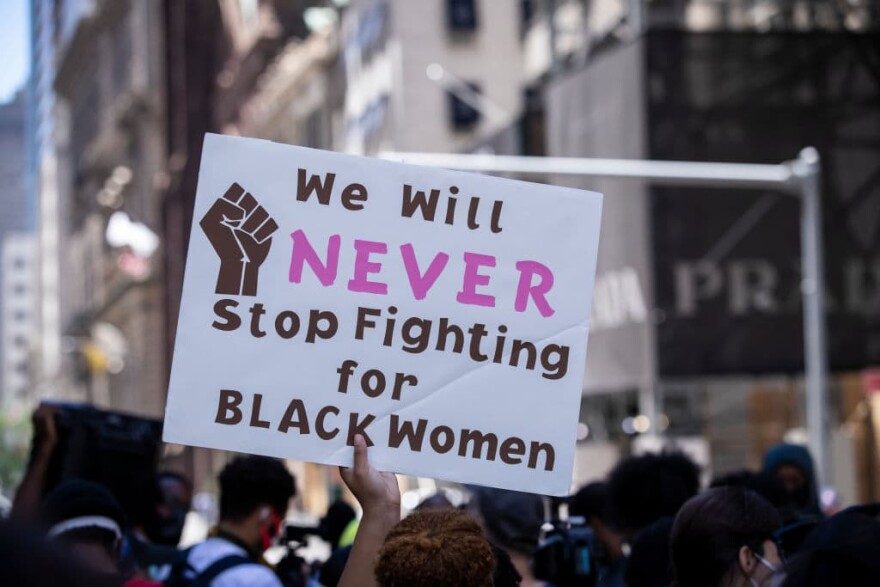Three months ago, Breonna Taylor was shot and killed by police in her apartment.
Two months before George Floyd was killed by police in Minneapolis, Taylor, a 26-year old Black emergency medical technician, was in her home in Louisville, Kentucky, when plain-clothed police burst in with a no-knock warrant. Her boyfriend, thinking they were intruders, fired a shot.
The police returned with a barrage of bullets, killing Taylor. The three Louisville Metro Police Department officers involved have not been charged.
Taylor’s death — and the deaths of many other Black women — haven’t sparked the same level of global outrage against police brutality as the killings of cisgender Black men by law enforcement.
Black women have the highest rates of homicide in the country, says Kimberlé Crenshaw, a professor of law at UCLA and Columbia Law School and the executive director of the African American Policy Forum. She says she has repeatedly seen the killings of Black women go unnoticed.
Crenshaw and the African American Policy Forum started the #SayHerName campaign to bring awareness to often invisible names of Black women who have been targets of law enforcement.
Some say it takes video footage in order to garner the attention of masses. Crenshaw argues that even when there have been past videos of brutality against Black women, they didn’t permeate the news cycle or spark a major outcry for accountability and action like we saw in Floyd’s case.
Take Natasha McKenna, for example. In 2015, the 37-year-old was tasered to death in jail while she was experiencing a mental health crisis, Crenshaw says. The scene was captured on video and distributed, yet little national attention was focused on her horrific death, she says.
“Their stories tend to just sort of dissipate into the ether,” Crenshaw says. “Had what happened on March 13 not happened just before two very high-profile killings of Black men, we probably wouldn’t be saying Breonna Taylor’s name either.”
About five days after the death of 18-year-old Michael Brown in Ferguson, Missouri, Crenshaw says 50-year-old Michelle Cusseaux was shot and killed “within seconds” of the police encountering her during a mental health call. Cusseaux’s mother organized a protest where her daughter’s casket was taken to Phoenix City Hall, she says.
“A Black woman has been killed and no one was saying her name,” Crenshaw says.
“So we started collecting other names of Black women who were killed by the police and going to the protests around Mike Brown and Eric Garner,” she says. “We went with a banner of the names of Black women who were killed and basically said, ‘Say her name. Say her name.’ ”
There’s a long history of sidelining Black women’s lived experiences. And it may be hard to conceptualize anti-Black violence against women because of the historical emphasis on Black men’s stories, she says.
During slavery in the United States, Black women endured endless labor, sexual assault and being torn away from their children. Black men also bared inhumane treatment during slavery, but oftentimes their stories became the center narrative, Crenshaw says.
“For our entire history of slavery and efforts to challenge it, the way that it’s experienced by men has been at the center of it,” she says. “And that has created a narrative about what anti-Black racism looks like. That is accurate, but it is not entirely inclusive.”
The overwhelming response to Floyd’s killing was in part because it’s “amplifying what we know racism to have been about,” Crenshaw says. Many people don’t have the framework to conceptualize the racist violence toward Black women because their stories have historically been erased or ignored, she says.
“We don’t tell the stories about the disrespect that Black women experienced. So not too surprisingly, when the police treat Black women in ways that are continuous with that legacy, we don’t have the stories,” she says.
Crenshaw coined the term intersectionality in 1989 to describe the intersection of political and social identities, such as race and gender. She says intersectionality must be addressed in the current movement against anti-Black racism in policing.
Last week, two Black trans women, 27-year-old Dominique “Rem’mie” Fells in Philadelphia and 25-year-old Riah Milton in Cincinnati, were both brutally murdered. On Sunday, thousands protested in New York to bring attention to Black trans lives.
Crenshaw says we must look at how “racism, transphobia and misogyny” intersect in their deaths.
“That is something that we have to continue to hold up when we talk about the deaths of Black women across the gender spectrum,” she says.
“It is the reality of living life in a Black body that makes you more subject to police violence,” she says. “Now, if that body happens to be gendered as something other than male, it also makes you vulnerable to being misremembered.”
And that’s exactly what the #SayHerName campaign is working to end — by keeping a spotlight on Black women’s lives.
“Say Her Name: Telling Stories of State Violence and Public Silence,” hosted by Crenshaw, will be held with the family members of the women uplifted by the #SayHerName campaign.
Ciku Theuri produced and edited this interview for broadcast with Tinku Ray. Serena McMahon adapted it for the web.
This article was originally published on WBUR.org.
Copyright 2021 NPR. To see more, visit https://www.npr.org. 9(MDA5NTM4MTIyMDE0MTg3NDc2MTVlZjdmNQ001))





